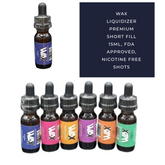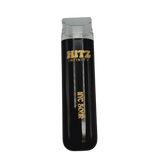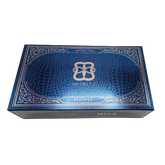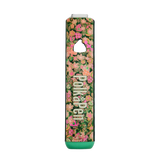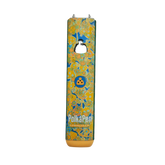As the popularity of cannabis products continues to rise, many people find themselves asking the same question: What’s the difference between THC and CBD? While both compounds come from the cannabis plant, their effects, legality, and uses are vastly different.
In this blog, we’ll break down THC vs CBD, their benefits, uses, and key differences, so you can make informed choices whether for wellness, medical use, or recreation.
What Are Cannabinoids?
Cannabinoids are natural compounds found in cannabis plants. The human body has a system called the endocannabinoid system (ECS), which plays a role in regulating sleep, mood, appetite, pain, and immune response. Cannabinoids interact with this system to produce various effects.
The two most well-known cannabinoids are:
-
THC (Tetrahydrocannabinol)
-
CBD (Cannabidiol)
What Is THC?
Tetrahydrocannabinol (THC) is the primary psychoactive compound in cannabis. It binds directly to CB1 receptors in the brain and central nervous system, producing the well-known “high” or euphoric effect.
Key Highlights:
-
Causes intoxication or euphoria
-
Found in higher concentrations in marijuana
-
May impair coordination and reaction time
-
Often used for pain relief, appetite stimulation, and nausea control
What Is CBD?
Cannabidiol (CBD) is non-psychoactive, meaning it doesn’t produce a high. Instead, it has calming and anti-inflammatory properties. CBD interacts indirectly with the ECS and other receptors like serotonin and vanilloid receptors.
Key Highlights:
-
Does not cause a high
-
Hence Often extracted from hemp (low-THC cannabis)
-
Gaining popularity in wellness and skincare
-
Hence Commonly used for anxiety, inflammation, seizures, and chronic pain
Benefits of THC
-
Pain Relief: Commonly used in managing chronic pain in conditions like arthritis or nerve damage.
-
Appetite Stimulation: Often recommended for patients with HIV/AIDS or undergoing chemotherapy.
-
Anti-Nausea: Effective in treating nausea and vomiting caused by chemotherapy.
-
Muscle Spasticity Relief: Used in treating symptoms of multiple sclerosis (MS).
Benefits of CBD
-
Reduces Anxiety and Stress: Shown to reduce symptoms of social anxiety and PTSD.
-
Anti-Inflammatory Properties: Helps reduce inflammation, making it useful for arthritis and skin conditions.
-
Seizure Control: The only FDA-approved cannabis-derived drug, Epidiolex, contains CBD and treats rare epilepsy forms.
-
Better Sleep: Promotes better sleep quality in individuals suffering from insomnia or chronic stress.
Common Uses and Product Types
THC Products:
-
Flower (bud): Smoked or vaporized
-
Edibles: Gummies, chocolates, beverages
-
Oils & Tinctures: Concentrated extracts for sublingual use
-
Vape Cartridges: Fast-acting but may have health risks
CBD Products:
-
Oils & Tinctures: Popular for dosing flexibility
-
Topicals: Lotions, creams, and balms for localized relief
-
Capsules & Gummies: Easy for daily use
-
Pet Products: Hence Used for calming and pain relief in animals
You can also find full-spectrum, broad-spectrum, or CBD isolate products:
-
Full-spectrum: Contains THC and other cannabinoids
-
Broad-spectrum: THC-free but includes other cannabinoids
-
Isolate: Pure CBD only
Side Effects and Safety
THC Side Effects:
-
Dry mouth
-
Increased heart rate
-
Paranoia or anxiety (in high doses)
-
Hence Impaired short-term memory
CBD Side Effects:
-
Fatigue
-
Diarrhea
-
Changes in appetite
-
May interact with medications (especially blood)
Legal Considerations
THC Legality:
-
Legal for medical use in many U.S. states
-
Legal for recreational use in some states (e.g., California, Colorado)
-
Federally classified as a Schedule I substance
CBD Legality:
-
Hemp-derived CBD (with <0.3% THC) is legal under federal law
-
Cannabis-derived CBD legality varies by state
-
Always check local and state laws before purchasing
Choosing Between THC and CBD
When choosing between THC and CBD, consider:
-
Purpose: For euphoria or stronger relief, THC may be ideal. For daily wellness, CBD is preferred.
-
Sensitivity: New users or those sensitive to psychoactive effects should start with CBD.
-
Combination: Some users benefit from both in balanced doses — this is known as the entourage effect, where cannabinoids work better together.
Conclusion
THC and CBD are both powerful cannabinoids with unique effects and benefits. While THC offers stronger psychoactive effects and symptom relief, CBD is non-intoxicating and widely used for wellness purposes.
Choosing between the two depends on your health goals, tolerance, and legal access. Whatever your needs, always choose lab-tested, high-quality products and consult your healthcare provider for guidance.
FAQs
Is CBD legal in all 50 states?
CBD derived from hemp is legal federally, but some states have restrictions. Always check local laws.
Can CBD counteract THC's effects?
Yes, CBD may reduce some of the psychoactive effects of THC, like anxiety or paranoia.
Will CBD or THC show up on a drug test?
THC will show up. CBD may not, but full-spectrum products can contain trace THC.
What’s the safest way to consume THC or CBD?
Sublingual tinctures or edibles are safer than smoking. Start low and go slow.


